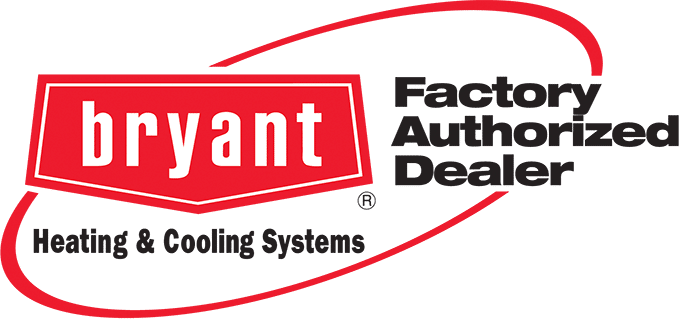
Whether you’ve just installed an air conditioner in your home for the first time, or simply want to learn more, our guide on how to use an air conditioner will help you get the most out of your unit. When an air conditioner is properly installed, maintained, and used, it can last 15+ years. See the menu below to jump ahead to a specific section:
- How Does an Air Conditioner Work?
- How To Use an Air Conditioner With Your Thermostat
- Air Conditioner Maintenance Tips
- When To Call an HVAC Technician
- Energy Savings Tips
How To Use an Air Conditioner: Your Complete Guide
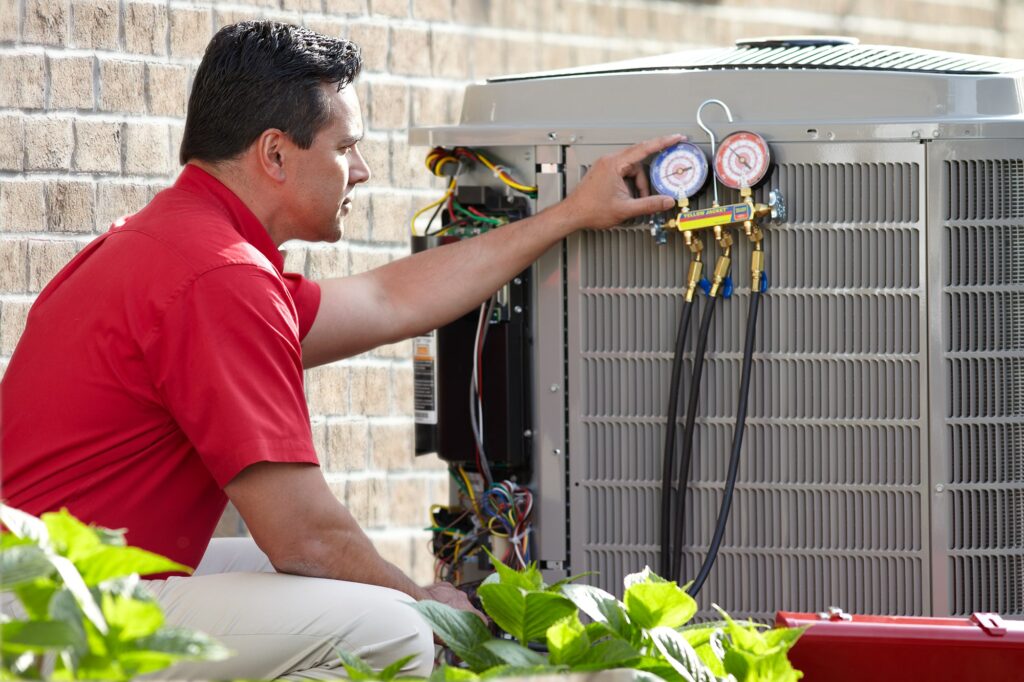
How Does an Air Conditioner Work?
First, let’s get something important out of the way first. There are many different types of air conditioners, and while they all work to cool down your home (or building), they don’t work the same way.
In this article, we’ll take a look at how the most common type of residential air conditioner works – the central air conditioner. To see a helpful overview on how central air conditioners work, check out the video below.
How to use an air conditioner: this helpful video will show you the basics
Central air conditioners work using your home’s existing ductwork and fan system. This is the same system that your furnace is connected to. So, when you turn on your furnace, hot air will come through your vents. In the same way, when you turn on your central air conditioner, cool air will come through your vents.
However, unlike your furnace, your air conditioner unit is installed outside of your house. The unit outside of your home has many components, including a condenser coils, fan blades, compressor, and grill, and other pieces that help the unit work properly. Inside the compressor, refrigerant is stored.
Refrigerant is a very important part of your AC unit. Refrigerant is a chemical that helps to absorb hot air and cool it down. Here’s a simple breakdown of the process:
- The liquid refrigerant inside of your air conditioner absorbs hot air from your home, which begins to cool down the air
- After this step, the refrigerant (which started as a liquid) changes into a gas and is put through a compressor
- Then, the refrigerant gas goes through condenser coils that allow the heat it has absorbed to be transferred to the air outside
- Refrigerant expands to decrease its pressure, which causes the indoor air to cool down
When you look at your air conditioner, you might not realize the complex chemical process that’s taking place inside while it runs! If you’re interested in the science behind your air conditioner, check out this helpful in-depth guide.
How To Use an Air Conditioner
Now that you know a bit more about how an air conditioner works, let’s learn more how to use an air conditioner. Your central air conditioner is controlled by your home’s thermostat.
Most thermostats are pretty simple to use. While you can buy a thermostat at the hardware store an install it yourself, it’s recommended that you work with an HVAC company to get it done right.
An improper installation can cause problems when you try to run your heat or air conditioner. An HVAC technician can also teach you how to use all the features on your thermostat so you can get the most out of your home’s heating and cooling systems.
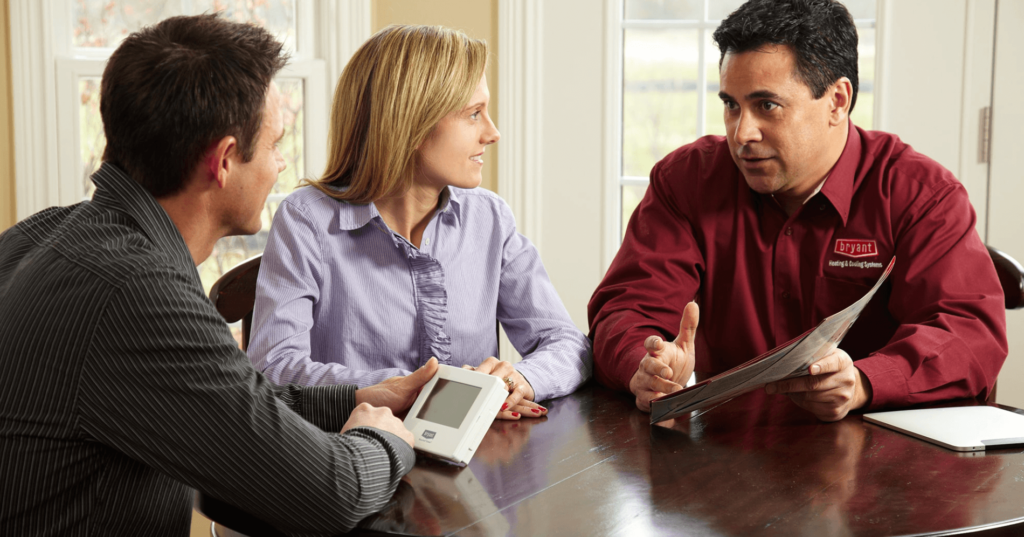
Rely on an HVAC technician to install your thermostat for you
Using your thermostat, you can set the temperature you want in your house. For example, you may want to set it to 73 degrees F (approximately 23 degrees C) for a comfortable temperature in the summer. The way that your air conditioner cools down your home will vary depending on if you have a single-stage AC, a dual-stage AC, or a variable speed AC unit.
Continue reading below to learn about the different types of central air conditioners. Single stage units are the most common type found in residential homes.
Single Stage AC Units
Single stage AC units work by turning on when the indoor air temperatures reaches a higher number than what you’ve set your thermostat to.
For example, if you set your thermostat to 73 F and the indoor air temperature reaches 74 F, it will turn on and run at full capacity until the indoor air temperature has reached 73.
Single stage AC units are very common in residential homes.
2-Stage AC Units
2-stage AC units, also called dual-stage, are similar to the single stage unit but have two settings: high and low. You can turn the unit on ‘high’ and it will run at maximum capacity to quickly cool your home.
For example, if you set your thermostat it 73 F and the indoor temperature reaches 76 F, you might run it on high to quickly cool down your home. But if it only reaches 74 F, and it’s not a very hot day, you might run it on low.
Variable Speed AC Units
Variable speed AC units, unlike the other two types of AC units listed, are essentially always running. However, they are not always running at full capacity.
Instead, these units will usually run on a low level (often 25% – 30% capacity) all or almost all of the time to keep temperatures in your home as consistent as possible. So, if you set your home to 73 F, it will almost always stay at that temperature, without any or a lot of fluctuation.
What you set your thermostat to and how often you adjust it will depend on your personal preferences and the type of air conditioner that you have. Since each make and model of thermostat will have different functions, it’s important to read your manual or talk to an HVAC professional to ensure you are using your thermostat properly.
Air Conditioner Maintenance Tips
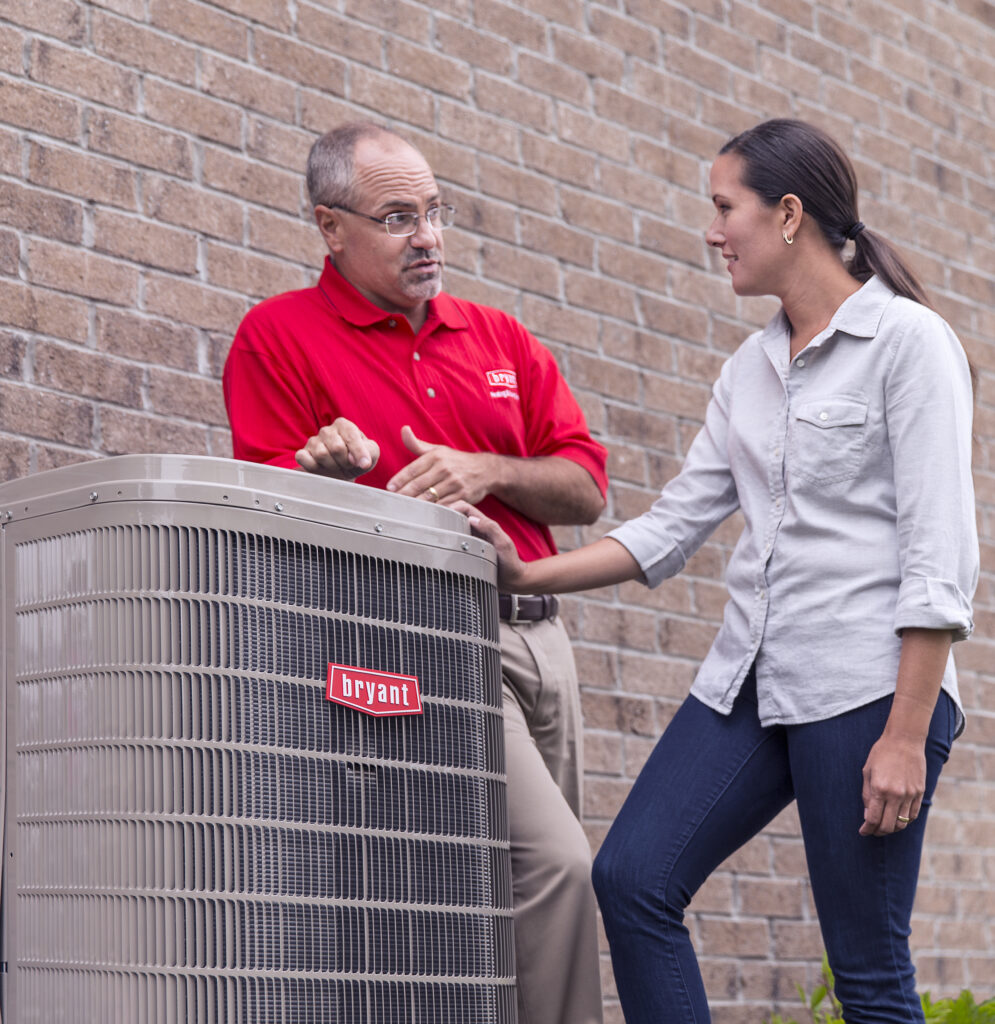
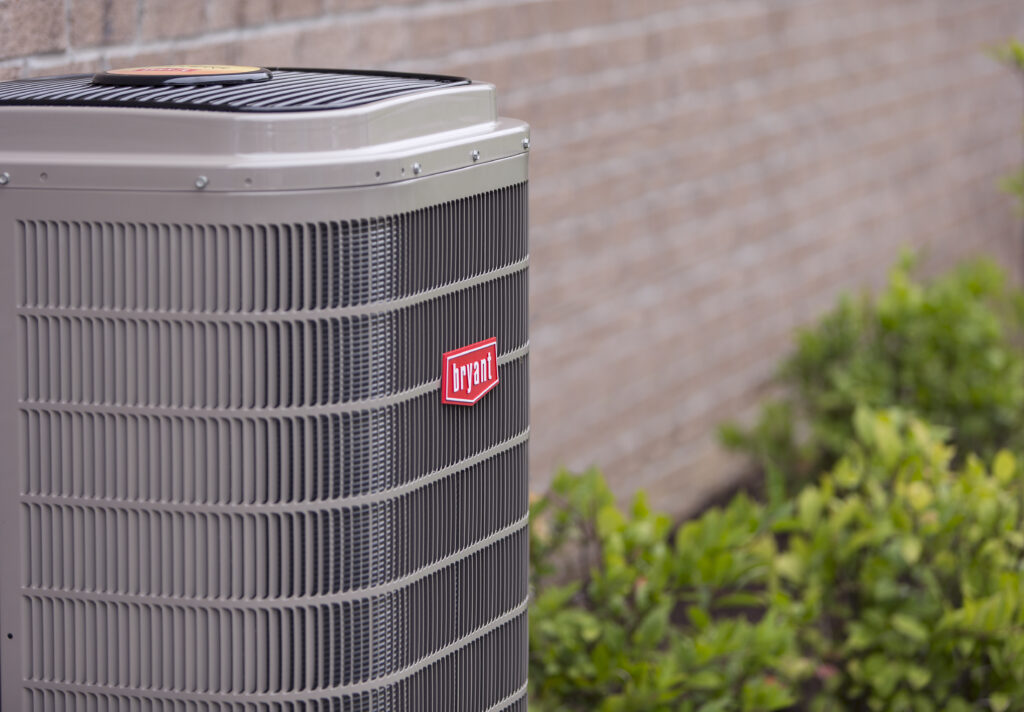
There are a number of things you can do to help you air conditioner last a long time
If you take good care of your air conditioner, it could last 15 – 20 years. That’s a long time! But many homeowners don’t know a lot about their HVAC systems, so they aren’t quite sure what they can do to make sure their unit lasts. When wondering how to use an air conditioner, one of the most important things to consider is ongoing use and maintenance. Here are some simple tips that will help ensure you get the most out of your air conditioner.
- Invest in a maintenance plan – Choosing to invest in a maintenance plan ensures that your unit is regularly serviced by HVAC professionals. This means that they will be able to keep things running smoothly, and catch any small issues before they become bigger ones. In some cases, a maintenance plan may also be required in order to keep your warranty valid.
- Change your air filters – The air filters in your furnace don’t only impact your heat, but also your cooling too. New, clean filters will ensure that your air conditioner runs properly. It won’t have to work extra hard to get your home cool, which means it is less likely to require repairs or early replacement.
- Clean Your Ducts – Duct cleaning, when done by a professional company, is not a scam. It’s a great way to keep your family healthy by ensuring your air is free of mould, allergens and contaminants. And, it helps ensure your furnace and AC properly distribute hot/cold air around your home.
When To Call An HVAC Technician
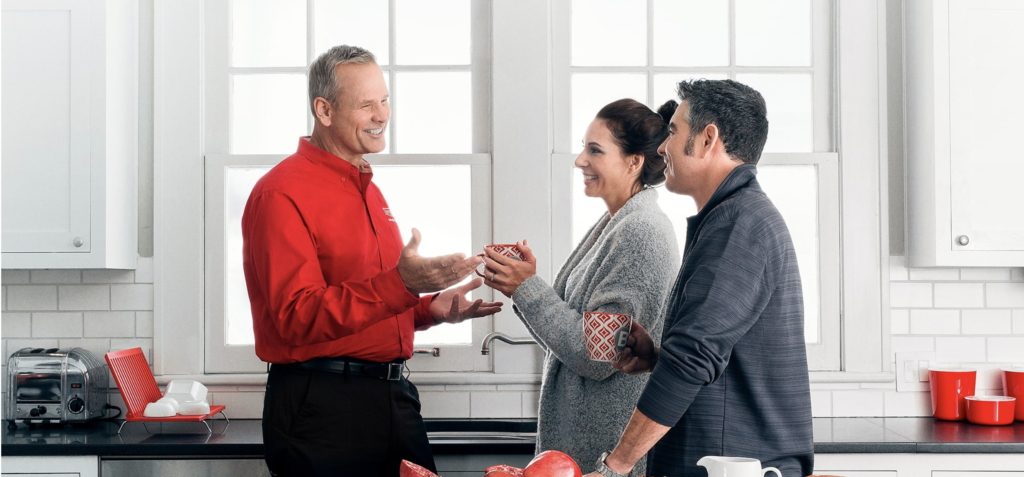
Learn when to call an HVAC Technician to service or inspect your air conditioner
While there are things you can do to help ensure your air conditioner continues to run smoothly, you may eventually run into an issue that you need to get checked out by a professional. The following includes some common signs that something might be wrong with your air conditioner:
- Strange noises – If you hear any strange noises while your air conditioner is running, it could be mean that there is a problem.
- Refrigerant leaks – One of the most common issues is refrigerant leaking. Refrigerant is a chemical that can be harmful to the environment when it leaks out of your unit, so if you notice a leak, call an HVAC technician right away.
- Not cooling your house down – If you notice your AC unit is running and running but isn’t cooling it down properly, there is likely a problem. Don’t wait until it stops working completely!
- Unit not turning on – If your unit doesn’t turn on at all, that is definitely a problem! It could be as simple as your thermostat not working, or there could be a major issue with the unit itself.
Trained Technicians also know how to handle air conditioners. There are many electrical components to your AC unit and other parts that are dangerous for homeowners to handle on their own. Never try to inspect your unit or fix a problem on your own. Always rely on a professional company to do the inspection and any necessary repairs for you.
Energy Saving Tips
While you may no longer be wondering how to use an air conditioner, you might want to know how can you get your air conditioner to work efficiently. Below are some helpful energy saving tips to help you use your air conditioner in the most efficient way. This not only helps the environment, but also your energy bills at the end of each month!
Choose a smart thermostat
A smart thermostat can make energy-efficient decisions for you
Choosing a smart thermostat is a great way to get the most out of your AC unit. Thermostats like the Bryant® Housewise™ thermostat can automatically adjust settings and temperatures to ensure you get maximum efficiency as you run your air conditioner. This means you won’t have to constantly adjust the thermostat yourself – the advanced technology can do it all for you and ensure your energy bills are as low as possible, even during the hottest months.
Create a Schedule On Your Thermostat
If you don’t have a smart thermostat that can run independently, you can still make eco-friendly decisions. One of the best ways to ensure your unit is always running efficiently is by keeping the temperatures warmer when you are not home. For example, if you and your family are typically out of the house from 9-5, set the temperature a few degrees higher when no one is home. Most thermostats allow you to program in a schedule, so that it will automatically change when your thermostat’s clock hits a certain time.
Ensure Good Home Airflow
Whenever possible try to keep doors open in your home and vents unblocked. This will help ensure that your home has better airflow, and can help prevent your air conditioner from running overtime. If you have blocked vents and closed doors, your home will take longer to cool down, and this can cause your air conditioner to run longer and harder.
Need Air Conditioner Services, Repair, or Maintenance? Trust Service 1st!
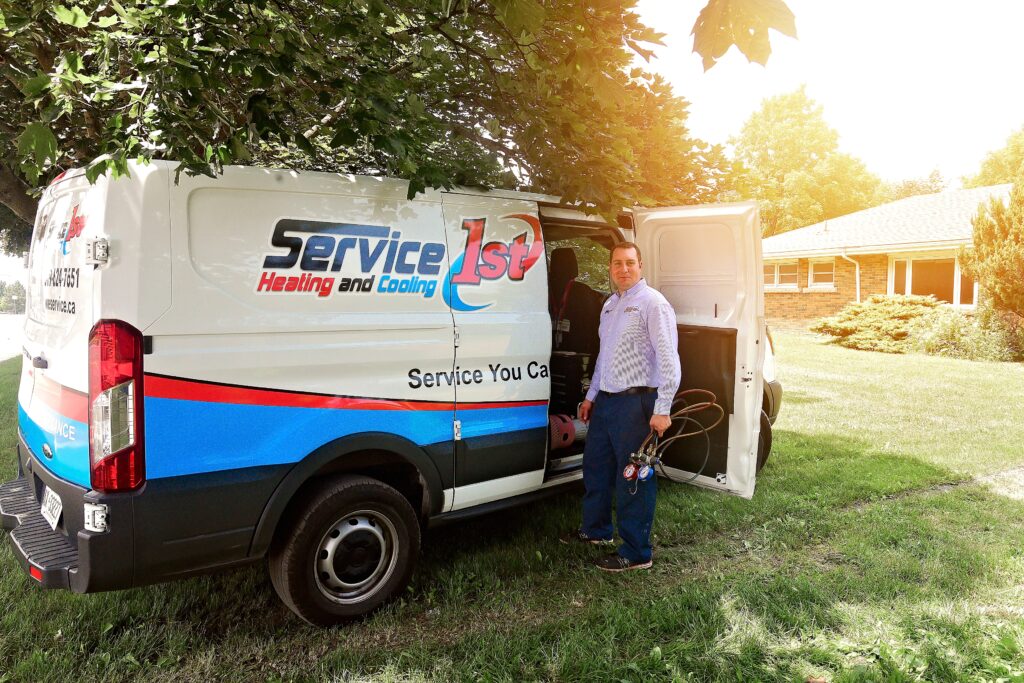
Now that you know how to use an air conditioner, you may be wondering about servicing, installing, or maintaining an air conditioner unit. If you need any HVAC services, including services for your air conditioner unit, you can rely on the experts at Service 1st.
We have been serving homeowners in Cambridge and the surrounding areas for over 30 years and have a proven record of excellence. Whether it’s time to replace your air conditioner now or you want to learn more about what unit to buy in the future, we can help.
We are a locally owned and operated business that prides itself on the highest quality work and installation of the highest quality products. We have received the prestigious Circle of Champions award from Bryant – an honour that highlights our commitment to quality, leadership, and excellence in the HVAC industry. We are an Elite Bryant Factory Authorized Dealer and offer our customers the highest quality products and services.







